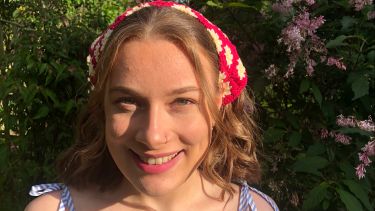The course really shapes you into a 'proper' scientist

What made you want to study your course?
When I was at school, most people in my classes were applying to study medicine - although I was interested in the science side of this, I was less keen on the idea of actually being a doctor. With that in mind, Biomedical Science sounded like the perfect solution, allowing me to focus specifically on human biology and disease.
What made you decide to study at the University of Sheffield?
I was very nervous to start university and have lived next to Sheffield all my life, so decided the best thing for me was to commute into university. It all worked out very well because I knew from the first applicant day I attended that the Biomedical Science course offered here was everything I was looking for, offering a broad range of modules to help me figure out my areas of interest.
What have you enjoyed most about your course so far?
I have absolutely loved my project work in the lab - it was very exciting to be working with equipment and using techniques that I'd only ever learnt about in lectures until that point. There is such a range of focuses amongst the labs within Biomedical Science, meaning that I was able to pursue a project I was really interested in. Generating and interpreting novel data gave me the opportunity to apply all the skills I had acquired in the run up to my final years and a good insight into the nature of academic research.
What skills have you developed during your course?
The course very much shapes you to be a 'proper' scientist by helping you to acquire the ability to critically analyse data. This means that instead of just taking what is presented at face value, you can actually start to make your own judgements about the evidence presented, think about how the results of one paper might relate to the results of another, and suggest future work that could be done to further the field.
What would you say to a student thinking about studying your course at Sheffield?
Go for it! I have absolutely loved the course, being able to tailor it according to my preferences by picking from a wide range of modules, especially in third year. The support available from the department has also been excellent in my experience, and the staff are constantly using feedback from students to improve the course.
What are you planning to do after your degree?
I was very fortunate to complete my fourth-year project in the lab of Dr Tsakiridis, working with human embryonic stem cells! I absolutely loved the lab work, having the opportunity to use a range of techniques including qPCR, immunostaining and flow cytometry. Because of this, I was very keen to pursue further research. I am very excited that I will be continuing my study at Sheffield, doing a PhD in developmental neurobiology in the labs of Dr Tsakiridis and Dr Bose.

International undergraduate scholarships
We are offering scholarships of £2,500 for each year (subject to a 60% average) of your undergraduate degree. The maximum value is £10,000 for four-year programmes.

